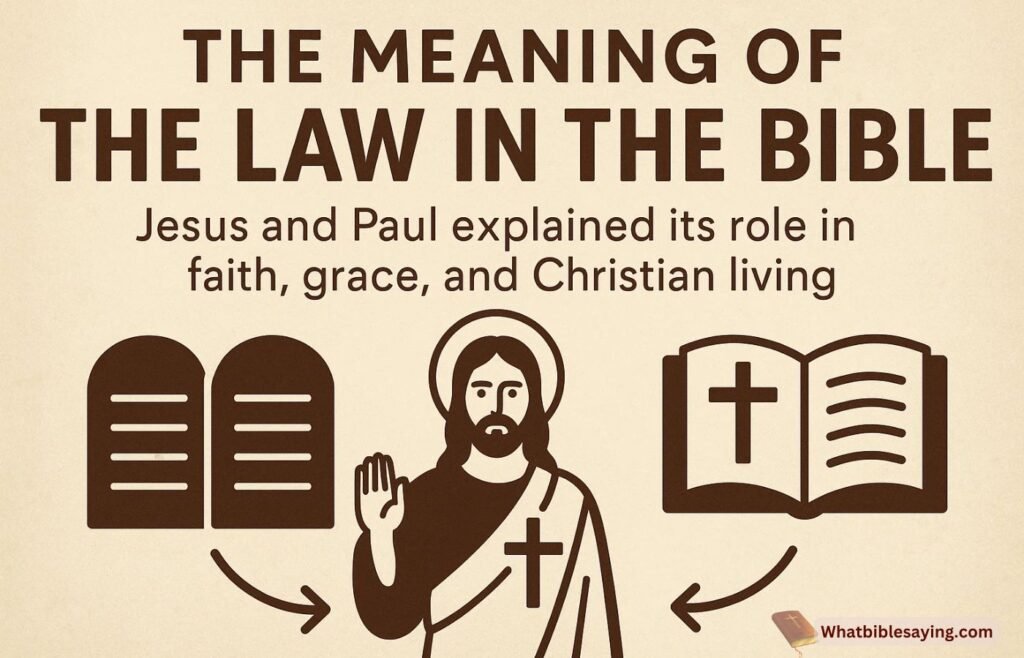 When you hear the word law, maybe you think of rules posted on the side of the road, a police officer giving directions, or the weight of a courtroom. But in the Bible, the word “law” reaches deeper than that. It doesn’t only speak of regulations, it tells us about God’s heart, His character, and His way of guiding His people.
When you hear the word law, maybe you think of rules posted on the side of the road, a police officer giving directions, or the weight of a courtroom. But in the Bible, the word “law” reaches deeper than that. It doesn’t only speak of regulations, it tells us about God’s heart, His character, and His way of guiding His people.
The Law in Scripture is not a cold list of do’s and don’ts. It’s a story of relationship. It’s the way God revealed His holiness to Israel, the path He offered to draw near to Him, and later the foundation that pointed straight to Jesus Christ.
Today, I want to walk with you slowly through what the Bible says about the Law: what it meant for ancient Israel, what Jesus taught about it, how Paul explained it, and what it still means for you and me right now.
What Is the Meaning of the Law in the Bible?
In its simplest sense, the Law in the Bible refers to God’s instructions given to His people. The Hebrew word often translated as “law” is Torah, which means “instruction” or “teaching.”
The Torah isn’t just about legal codes, it’s about life. It contains the first five books of the Bible (Genesis through Deuteronomy) and includes stories, commands, moral lessons, and covenant promises.
The Ten Commandments are the most famous summary of the Law (Exodus 20). They cover loving God (no idols, keeping the Sabbath, honoring His name) and loving people (honoring parents, avoiding murder, adultery, theft, lies, and coveting).
Beyond the Ten Commandments, the Law includes over 600 other commands that guided Israel’s worship, diet, festivals, and community life.
When God gave the Law at Mount Sinai, it wasn’t meant to crush Israel, it was meant to shape them into His holy people. “Be holy because I, the Lord your God, am holy” (Leviticus 19:2).
So when we ask, What is the meaning of the law in the Bible? the answer is this: the Law is God’s way of teaching His people how to live in relationship with Him and with others.
The Law Was a Covenant Relationship
We must remember that the Law wasn’t handed down as some random list of rules. It was given in the context of a relationship.
Think about it: God had just rescued Israel from slavery in Egypt. They were no longer under Pharaoh’s whip. They were free people walking toward the Promised Land. And at Mount Sinai, God said, “Now that I’ve redeemed you, here’s how to live as My covenant family.”
The Law was like wedding vows between God and Israel. It showed commitment, loyalty, and love. The people weren’t saved by keeping the Law, they were already saved from Egypt by God’s grace. But the Law helped them know how to live as God’s chosen people.
What Is the Best Definition of Law?
If we were to put it in one sentence, here’s the best way to define the Law in the Bible:
The Law is God’s holy instruction, given to reveal His character, expose human sin, and point us to our need for grace.
This three-part definition is important:
Reveals God’s Character – The Law shows us God’s holiness, justice, and love. For example, when it says “Do not steal,” we see that God values honesty. When it says “Keep the Sabbath holy,” we see that God cares for rest and worship.
Exposes Human Sin – Paul wrote in Romans 3:20, “Through the law we become conscious of our sin.” The Law is like a mirror. It shows us who we really are and how far we fall short of God’s glory.
Points to Grace – The Law was never the final answer. It was like a tutor, preparing God’s people for Christ. Paul said, “The law was our guardian until Christ came that we might be justified by faith” (Galatians 3:24).
So the Law is good and holy, but it also reminds us that we can’t save ourselves. We need a Savior.
What Is the Law According to Jesus?
When Jesus came, He didn’t throw the Law in the trash. He fulfilled it. His teaching helps us understand the deeper heart of God’s commands.
In Matthew 5:17, Jesus said:
“Do not think that I have come to abolish the Law or the Prophets; I have not come to abolish them but to fulfill them.”
That means Jesus completed what the Law pointed to. He lived a perfect, sinless life. He kept every part of God’s instruction without fault. And through His death and resurrection, He became the ultimate sacrifice that the Law’s offerings were pointing toward all along.
Jesus also summarized the entire Law in two powerful commands:
“Love the Lord your God with all your heart, soul, and mind.”
“Love your neighbor as yourself.” (Matthew 22:37–40)
According to Jesus, the Law isn’t about memorizing 600 rules. It’s about loving God fully and loving others selflessly. Every command flows from those two great loves.
Jesus and the Sermon on the Mount
If you read Matthew chapters 5–7, you’ll notice that Jesus often said, “You have heard that it was said… but I say to you…”
For example:
The Law said, “Do not murder.” Jesus said, “Don’t even hate your brother in your heart.”
The Law said, “Do not commit adultery.” Jesus said, “Don’t even lust after someone in your mind.”
Jesus wasn’t canceling the Law. He was deepening it. He was showing that obedience isn’t only about outward behavior, it’s about the condition of the heart.
That’s what makes His teaching both beautiful and challenging.
What Did Paul Mean by the Law?
Paul, once a strict Pharisee, knew the Law inside and out. After meeting Jesus, his view of the Law transformed.
In Romans, Galatians, and other letters, Paul explained that:
The Law is holy and good – “So then, the law is holy, and the commandment is holy, righteous and good” (Romans 7:12).
The Law cannot save us – “For no one will be declared righteous in God’s sight by the works of the law” (Romans 3:20).
The Law points to Christ – “Christ is the culmination of the law so that there may be righteousness for everyone who believes” (Romans 10:4).
Paul used the example of a tutor or guardian. Just like a guardian helps raise a child until they’re grown, the Law helped guide Israel until Jesus came. Now, in Christ, we live not under the Law’s curse, but under grace.
This doesn’t mean we live lawlessly. Instead, the Spirit writes God’s commands on our hearts. As Paul said in Galatians 5, we now walk by the Spirit, producing fruit like love, joy, peace, patience, and kindness.
The Law and Grace: A Tension Resolved in Christ
Some people think the Law and grace are opposites. But the truth is, they work together in God’s story.
The Law shows us our sin.
Grace saves us from our sin.
Imagine going to the doctor. The X-ray machine reveals your broken bone, but it can’t heal it. The Law is like that X-ray. It shows us the break. Grace, through Jesus, is the healing surgery.
So the Law is not your enemy. It’s your teacher, leading you to the Savior. And once you belong to Christ, you live in freedom, not freedom to sin, but freedom to love.
How Do Christians Relate to the Law Today?
This is where things get practical. As believers, how should we view Old Testament laws today?
Moral Laws Still Apply – Commands about honesty, sexual purity, honoring parents, and loving neighbors are timeless. They reflect God’s character.
Ceremonial Laws Are Fulfilled – Sacrifices, temple rituals, and food restrictions pointed to Christ. Since He fulfilled them, we are no longer bound by them (see Hebrews 10).
Civil Laws Were for Israel – Guidelines about land, kings, and ancient courts applied specifically to Israel as a nation. They give us wisdom, but they aren’t binding on modern believers.
So we don’t follow the Law to earn salvation. We follow Christ, who fulfills the Law. And by the Spirit, we live out the moral principles of God’s Word with love.
Stories That Bring the Law to Life
Let me share a couple of short stories to bring this closer to home.
The Young Man and the Speed Limit
A young man once told me, “I’ve never been pulled over, but every time I see a speed limit sign, I feel guilty because I know I’ve gone over it before.” That’s how the Law works. It tells us where the line is, and makes us aware of our failures. But Jesus comes alongside us and says, “I’ve paid your fine. Now drive with Me in freedom.”The Farmer’s Fence
A farmer put up a fence to keep his sheep from wandering into danger. The sheep didn’t always like the fence, but it protected them. That’s the Law. It sets boundaries for life. But when Christ came, He became the Good Shepherd. He doesn’t just keep us fenced in, He walks with us, guiding us to green pastures.
Living the Law of Love
At the end of the day, the Law is not about heavy burdens, it’s about love.
Paul wrote in Romans 13:10, “Love is the fulfillment of the law.”
When you forgive someone, you fulfill the Law.
When you tell the truth, you fulfill the Law.
When you choose kindness over bitterness, you fulfill the Law.
That’s the Spirit’s work in us. It’s not about checking boxes. It’s about living a life so full of God’s love that His Law naturally shines through us.
Conclusion: The Law Leads Us to Christ
So what is the Law in the Bible? It is God’s holy instruction, given to reveal His heart, expose our sin, and point us toward Jesus.
To Israel, it was covenant guidance.
To Jesus, it was fulfilled in perfect love.
To Paul, it was a tutor that prepared the way for grace.
And to us, it is a reminder: you can’t earn God’s favor, but you can live in His love.
Friend, don’t be afraid of the word “law.” See it as the story of a holy God reaching out to a broken people. And see in Jesus the One who completed the Law so you can live in freedom.












